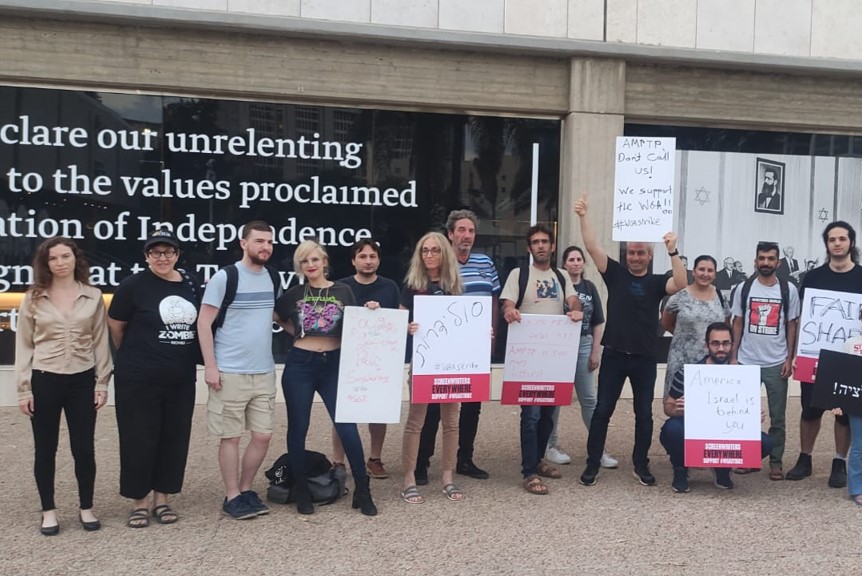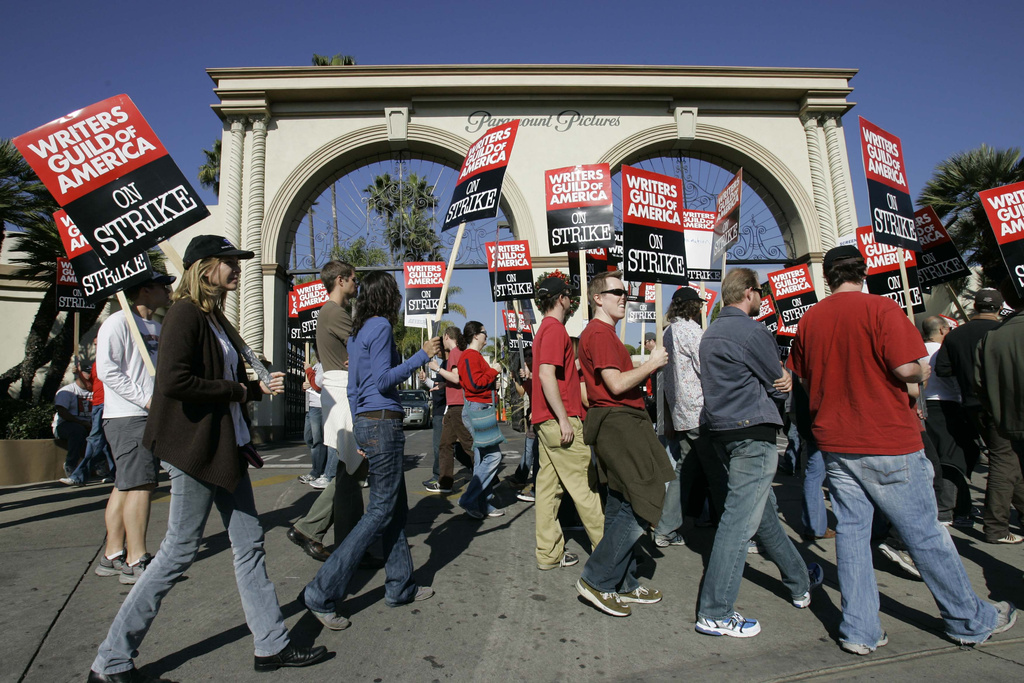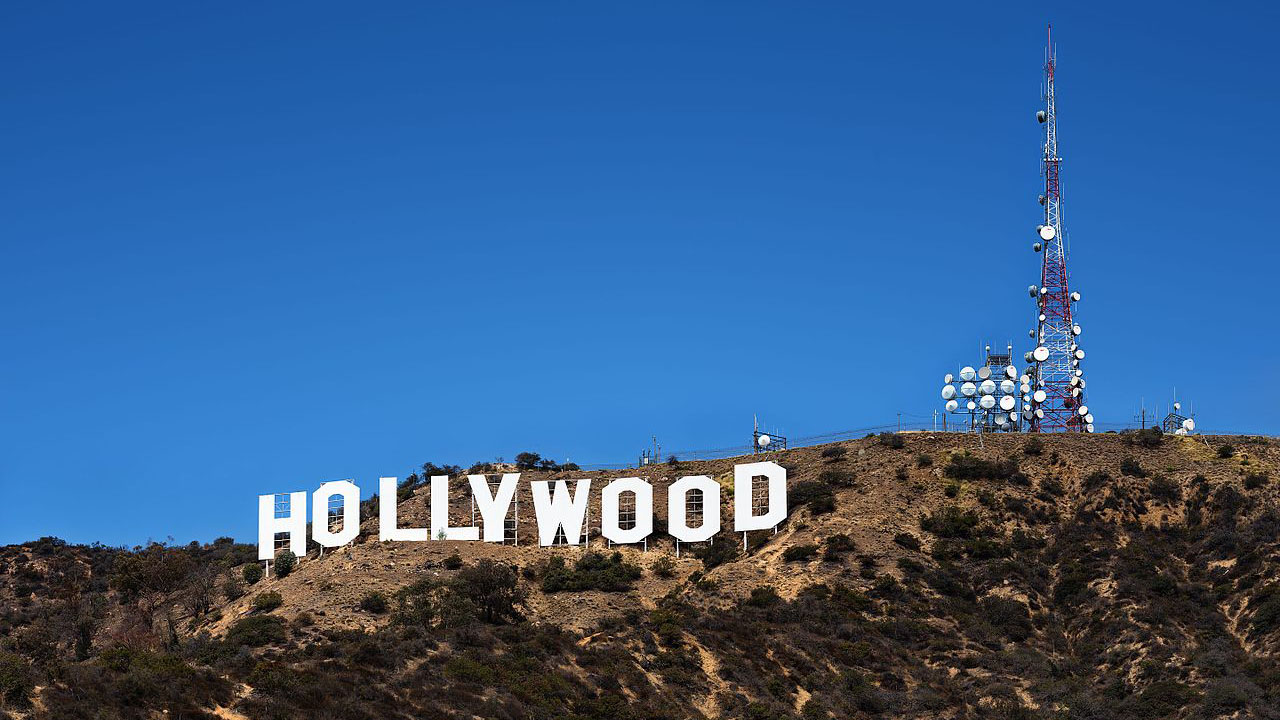
Members of the Screenwriters Guild of Israel (SGI) held a solidarity event in Tel Aviv last Wednesday in support of the ongoing Hollywood screenwriters' strike. The event took place as part of an international day of solidarity organized by the International Affiliation of Writers Guilds (IAWG), of which the SGI is a member, and the Federation of Screenwriters in Europe (FSE).
Approximately 11,000 Hollywood screenwriters, unionized in the Writers Guild of America (WGA), have been on strike for more than 45 days in demand of a new collective agreement. The strike began after the previous collective agreement, which was signed about six years ago, expired on May 1, with writers arguing that the Alliance of Motion Picture and Television Producers (AMPTP) torpedoed negotiations and refused to address the core issues raised by the union.

Along with the demand for improved payment and more adequate working conditions, the screenwriters in Hollywood are also demanding an improvement in the royalties for the use of content on streaming platforms. In particular, the writers are pushing for the creation of a payment model based on the success of streaming platforms and demanding that viewership data be made more transparent to creators – a move that streaming companies strongly oppose.
Another central issue in the negotiations is the protection of writers’ rights in light of the expanding use of artificial intelligence (AI) software. The screenwriters are demanding that regulations be established in this area to regulate issues such as copyrights for works written with the assistance of AI alongside significant human labor and to maintain their rights and job security.
"The corporations are getting richer while we, the ones who create the content for them, are collapsing"
"The screenwriting profession is being eroded all over the world, especially in Israel but also in the United States," said Nadav Ben Simon, chairman of the SGI. "The corporations are getting richer while we, the ones who create the content for them, are collapsing. We are proud to stand in solidarity and support our brothers and sisters in the US in their just struggle. At the same time, we are also fighting here in Israel to increase budgets and apply regulations to everyone, including the billion-dollar companies from abroad. In the end, the fight for the screenwriters' working conditions is a fight for culture and creativity."
"The changes initiated by the WGA in the past were significant paradigm shifts, and the current strike is also about fundamental issues that concern us as well," said Maor Gillerman, the SGI representative to the IAWG. "For years, our organization has been a member of the IAWG and we are proud to take part in solidarity in this struggle as well. We also want better payment terms, improved royalties, transparency and restrictions on artificial intelligence. Therefore, this struggle is a joint struggle, and the success of the union in the US will also affect us."

Some of the screenwriters who came to the event emphasized that they also expect the American screenwriters to show solidarity with Israeli creators, such as by maintaining their copyrights for Israeli series and works that are sold to American production companies.
"A victory in the United States will be a victory for screenwriters everywhere"
Screenwriters’ unions from 35 countries, representing over 65 thousand television and film writers around the world, took part in the international day of solidarity. Protests were held in front of the Netflix offices in Buenos Aires and Seoul, the European Parliament in Brussels, the Swedish Parliament in Stockholm, the Eiffel Tower in Paris and in front of the Apple and Amazon offices in Toronto, among other locations.
Among the demonstrators at the support rally held in Leicester Square in London were Charlie Brooker, creator of the series Black Mirror, Jesse Armstrong, creator of the series Heirs, Russel T Davies, creator of the series Doctor Who, and Jack Thorne, creator of the series His Dark Materials. "The companies that are looking to exploit and reduce the scope of writers are global, and therefore our response is also global," said IAWG chairman Thomas McLaughlin. "The victory achieved in the United States will be a victory for screenwriters everywhere."
Many films, TV shows and series have been affected by the screenwriters' strike so far, with some projects having to continue without writers and others being stopped completely. The WGA went on strike for more than three months between November 2007 and February 2008, a strike that cost the American entertainment industry about half a billion dollars, which finally resulted in a collective agreement.
This article was translated from Hebrew by Nancye Kochen.






